Accounting interns play a key role in supporting the financial operations of a company. They assist with tasks such as bookkeeping, preparing financial reports, and analyzing data, which helps ensure the accuracy and efficiency of financial processes.
Skills required for an accounting intern include a solid understanding of accounting principles, proficiency in software like Excel, and strong analytical abilities. Additionally, attention to detail and good communication skills are important for success in this role.
Candidates can write these abilities in their resumes, but you can’t verify them without on-the-job Accounting Intern skill tests.
In this post, we will explore 7 essential Accounting Intern skills, 10 secondary skills and how to assess them so you can make informed hiring decisions.
Table of contents
7 fundamental Accounting Intern skills and traits
The best skills for Accounting Interns include Attention to Detail, Numerical Proficiency, Analytical Thinking, Time Management, Technical Proficiency, Communication Skills and Ethical Judgment.
Let’s dive into the details by examining the 7 essential skills of a Accounting Intern.
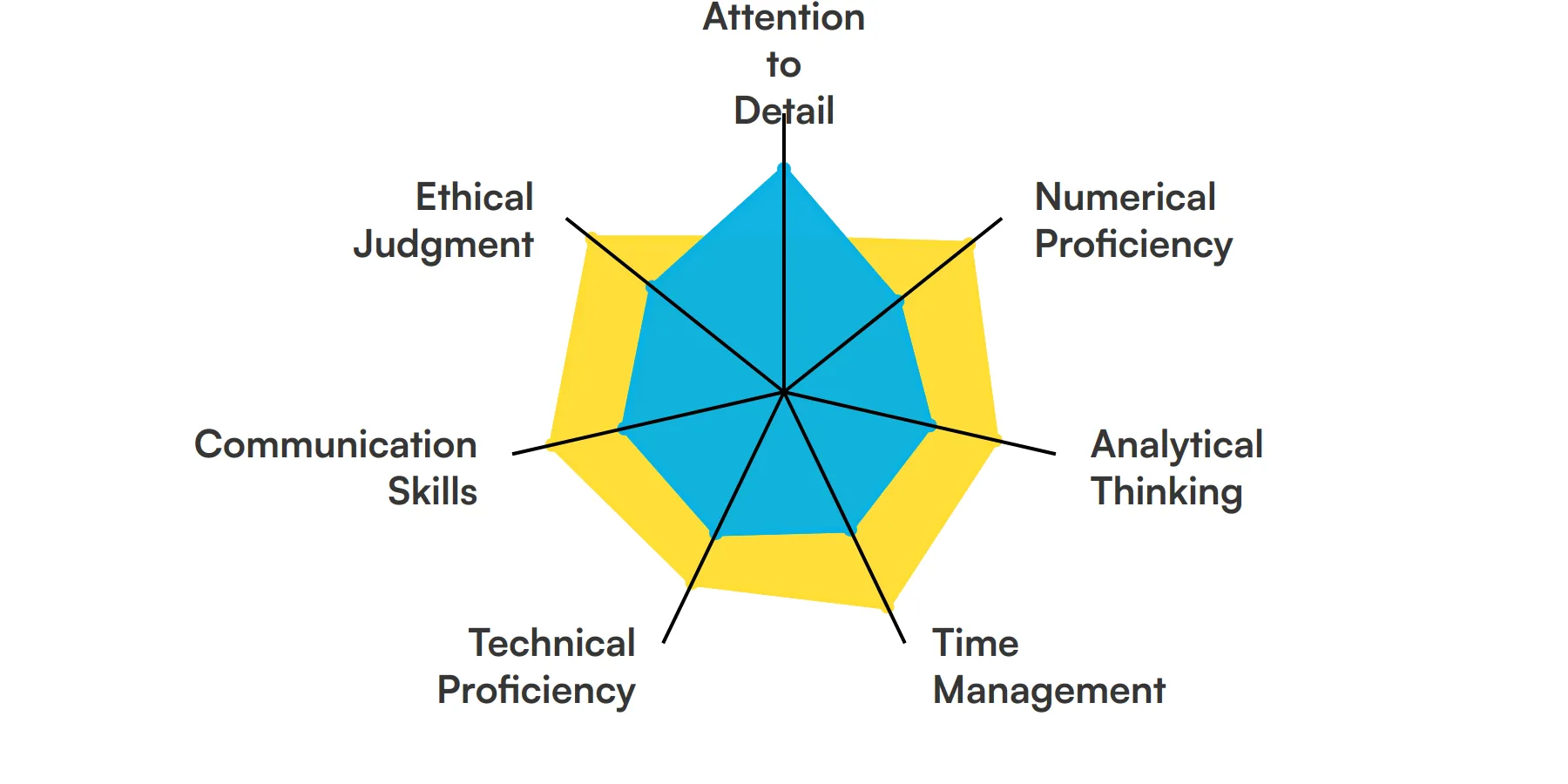
Attention to Detail
In accounting, precision is key. As an accounting intern, you'll need to meticulously review financial documents and ensure that every number is accurate. This skill helps in identifying discrepancies and maintaining the integrity of financial records.
For more insights, check out our guide to writing a Accounting Intern Job Description.
Numerical Proficiency
A strong grasp of numbers is fundamental for any accounting role. You'll be working with various financial data, performing calculations, and analyzing numerical trends. This skill ensures you can handle the quantitative aspects of accounting with ease.
Analytical Thinking
Being able to analyze financial data and draw meaningful conclusions is crucial. As an accounting intern, you'll need to interpret financial statements, identify patterns, and provide insights that can help in decision-making processes.
Time Management
Accounting tasks often come with strict deadlines. Effective time management allows you to prioritize tasks, meet deadlines, and manage multiple responsibilities without compromising on quality.
Technical Proficiency
Familiarity with accounting software and tools is a must. As an accounting intern, you'll likely use software like QuickBooks, Excel, or SAP to manage financial data, generate reports, and streamline accounting processes.
Communication Skills
Clear communication is essential for explaining financial information to non-accounting staff. You'll need to convey complex financial data in a way that is understandable to stakeholders, ensuring transparency and clarity.
Ethical Judgment
Integrity and ethical judgment are non-negotiable in accounting. As an intern, you'll handle sensitive financial information, and it's crucial to adhere to ethical standards and maintain confidentiality.
10 secondary Accounting Intern skills and traits
The best skills for Accounting Interns include Problem-Solving, Organizational Skills, Adaptability, Team Collaboration, Research Skills, Customer Service, Data Entry, Critical Thinking, Spreadsheet Proficiency and Regulatory Knowledge.
Let’s dive into the details by examining the 10 secondary skills of a Accounting Intern.
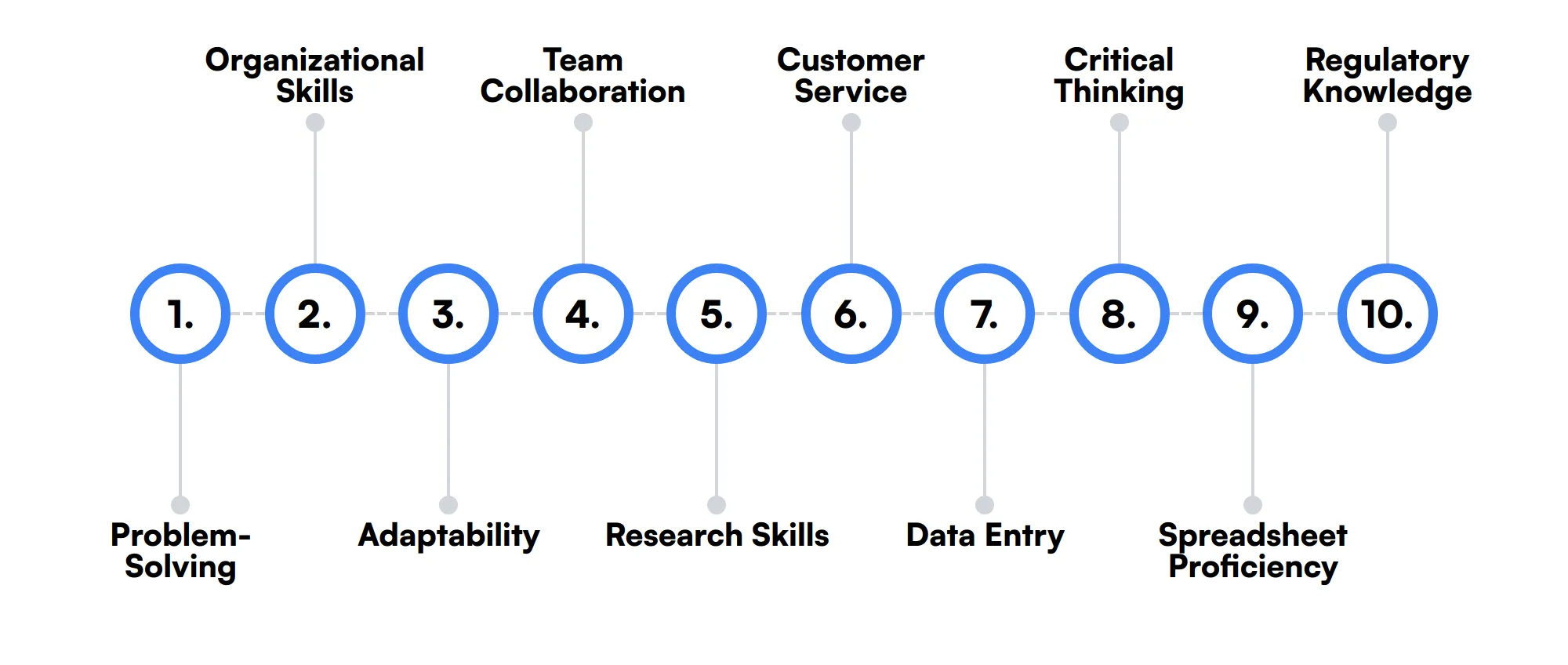
Problem-Solving
Accounting often involves troubleshooting discrepancies and finding solutions to financial issues. This skill helps you navigate challenges and implement effective resolutions.
Organizational Skills
Keeping financial documents and records organized is important. Good organizational skills ensure that you can easily access and manage information when needed.
Adaptability
The accounting field is constantly evolving with new regulations and technologies. Being adaptable allows you to stay current and adjust to changes efficiently.
Team Collaboration
Working well with others is important in an accounting role. You'll often collaborate with different departments, and being a team player ensures smooth workflow and effective communication.
Research Skills
Sometimes, you'll need to look up financial regulations or best practices. Strong research skills help you find accurate information quickly and apply it to your work.
Customer Service
If your role involves interacting with clients, good customer service skills are essential. You'll need to address client inquiries and provide them with accurate financial information.
Data Entry
Accurate data entry is fundamental in accounting. This skill ensures that financial information is recorded correctly, which is crucial for generating reliable reports.
Critical Thinking
Evaluating financial data and making informed decisions requires critical thinking. This skill helps you assess situations logically and come up with sound conclusions.
Spreadsheet Proficiency
Excel and other spreadsheet tools are commonly used in accounting. Proficiency in these tools allows you to create, manage, and analyze financial data effectively.
Regulatory Knowledge
Understanding financial regulations and compliance requirements is important. This knowledge ensures that your accounting practices adhere to legal standards.
How to assess Accounting Intern skills and traits
Assessing the skills and traits of an Accounting Intern can be a nuanced process. While resumes and cover letters provide a snapshot of a candidate's background, they often fall short in revealing the true depth of their abilities. To truly understand an intern's capabilities, a more hands-on approach is necessary. This involves evaluating their attention to detail, numerical proficiency, analytical thinking, time management, technical proficiency, communication skills, and ethical judgment.
One effective way to assess these skills is through practical assessments and real-world scenarios. For instance, you can create tasks that require the intern to demonstrate their numerical proficiency and analytical thinking by analyzing financial statements or preparing reports. Additionally, time management and attention to detail can be evaluated through deadline-driven projects.
To streamline this process, consider using Adaface assessments. These tests are designed to provide a comprehensive evaluation of a candidate's skills, leading to a 2x improved quality of hires and an 85% reduction in screening time. By leveraging such tools, you can ensure that you are selecting the most capable and well-rounded candidates for your accounting team.
Let’s look at how to assess Accounting Intern skills with these 4 talent assessments.
Attention To Detail Test
Our Attention to Detail Test evaluates a candidate's ability to focus on tasks and their willingness to be thorough in detail-oriented work.
The test assesses their skills in following instructions, verifying data, checking consistency, proof-reading, identifying mistakes, and detecting typos.
Successful candidates demonstrate a keen eye for detail and the ability to ensure high-quality work by meticulously processing information.
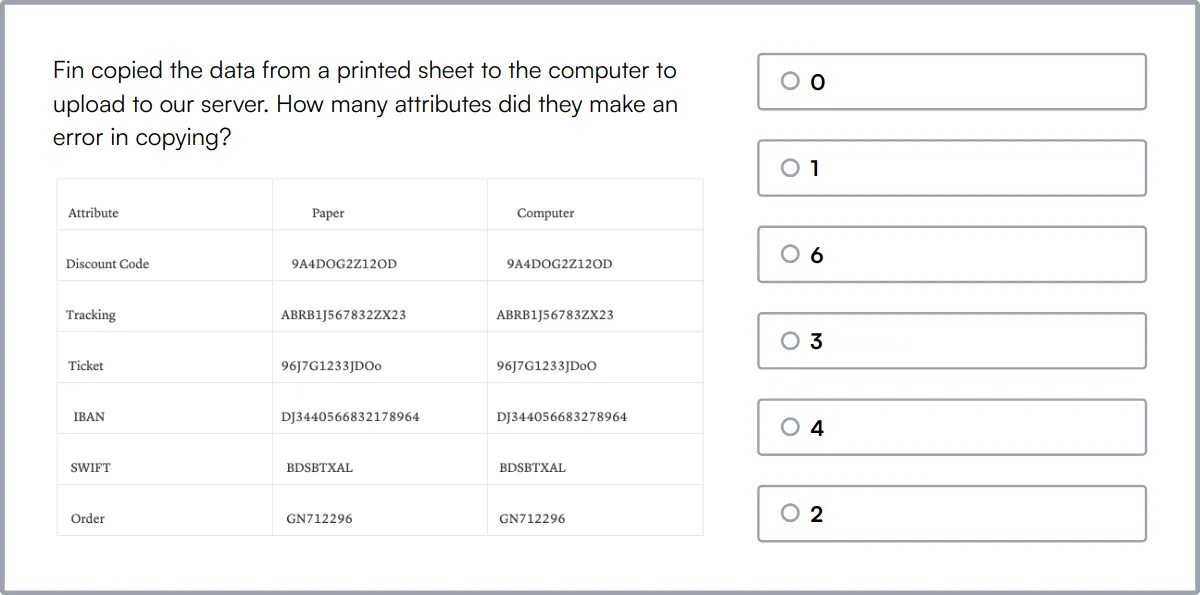
Numerical Reasoning Test
Our Numerical Reasoning Test assesses a candidate's ability to work with numbers through scenario-based questions.
The test covers skills such as understanding ratios, interpreting tables and graphs, performing currency and unit conversions, calculating percentages and compound interest, and solving profit and loss problems.
Candidates who excel in this test can interpret numerical data, identify underlying relationships, and make accurate calculations to solve problems.
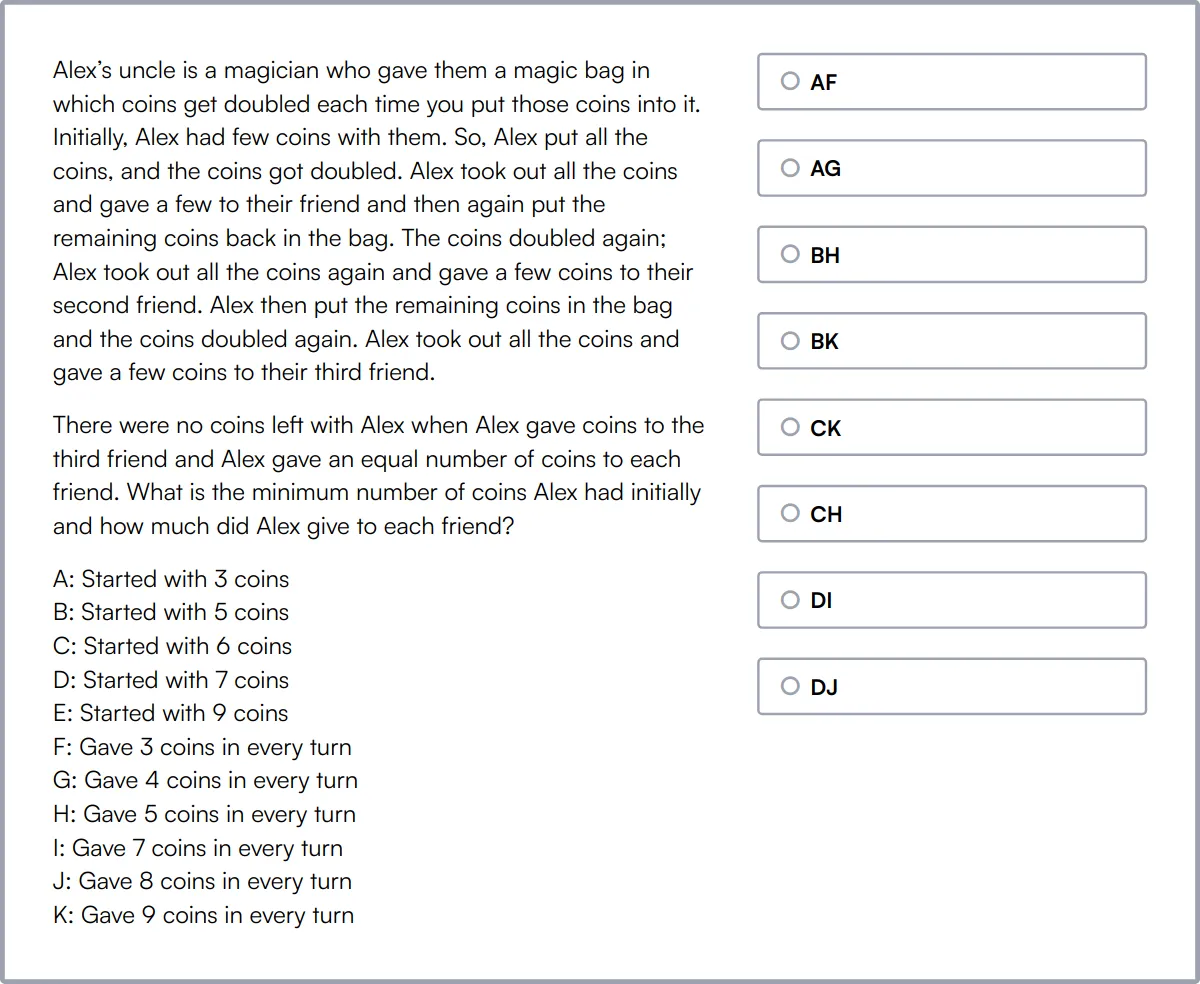
Analytical Skills Test
Our Analytical Skills Test evaluates a candidate's ability to comprehend scenarios, identify key information, apply logic, find patterns, and draw conclusions.
The test includes questions on logical reasoning, data visualization, data sufficiency, verbal reasoning, numerical reasoning, critical thinking, and problem-solving.
High-scoring candidates demonstrate strong analytical thinking and the ability to process complex information to make informed decisions.
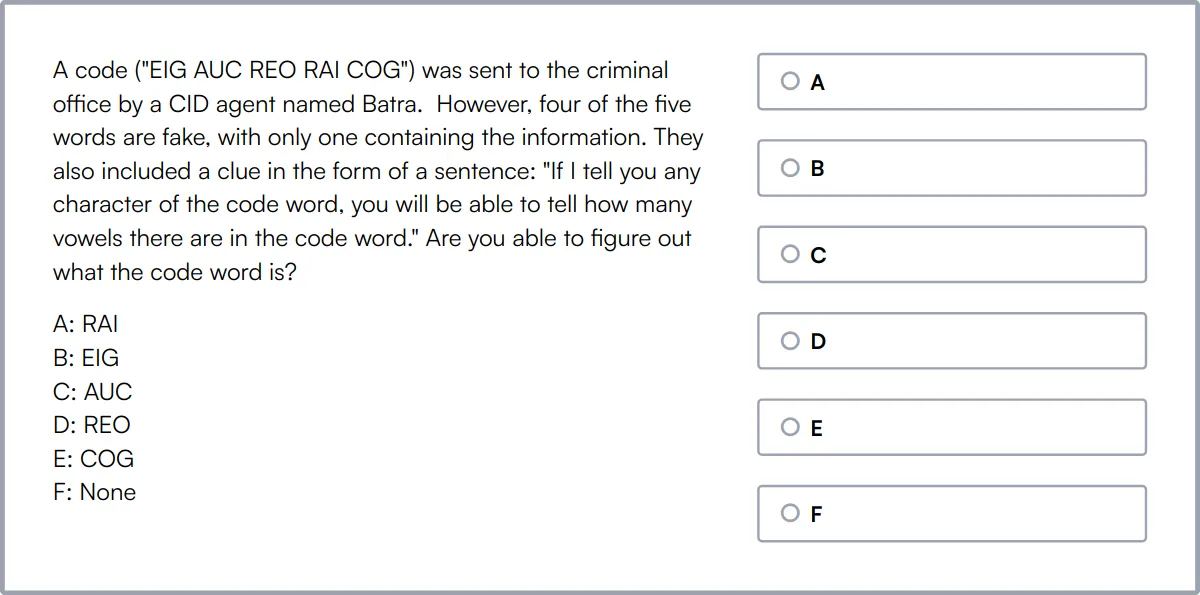
Communication Skills Test
Our Communication Skills Test evaluates candidates' communication skills, including verbal and written communication, active listening, and interpersonal skills.
The test covers situational judgement, attention to detail, critical thinking, and verbal reasoning.
Candidates who perform well in this test can effectively communicate with customers, colleagues, and stakeholders in various professional scenarios.
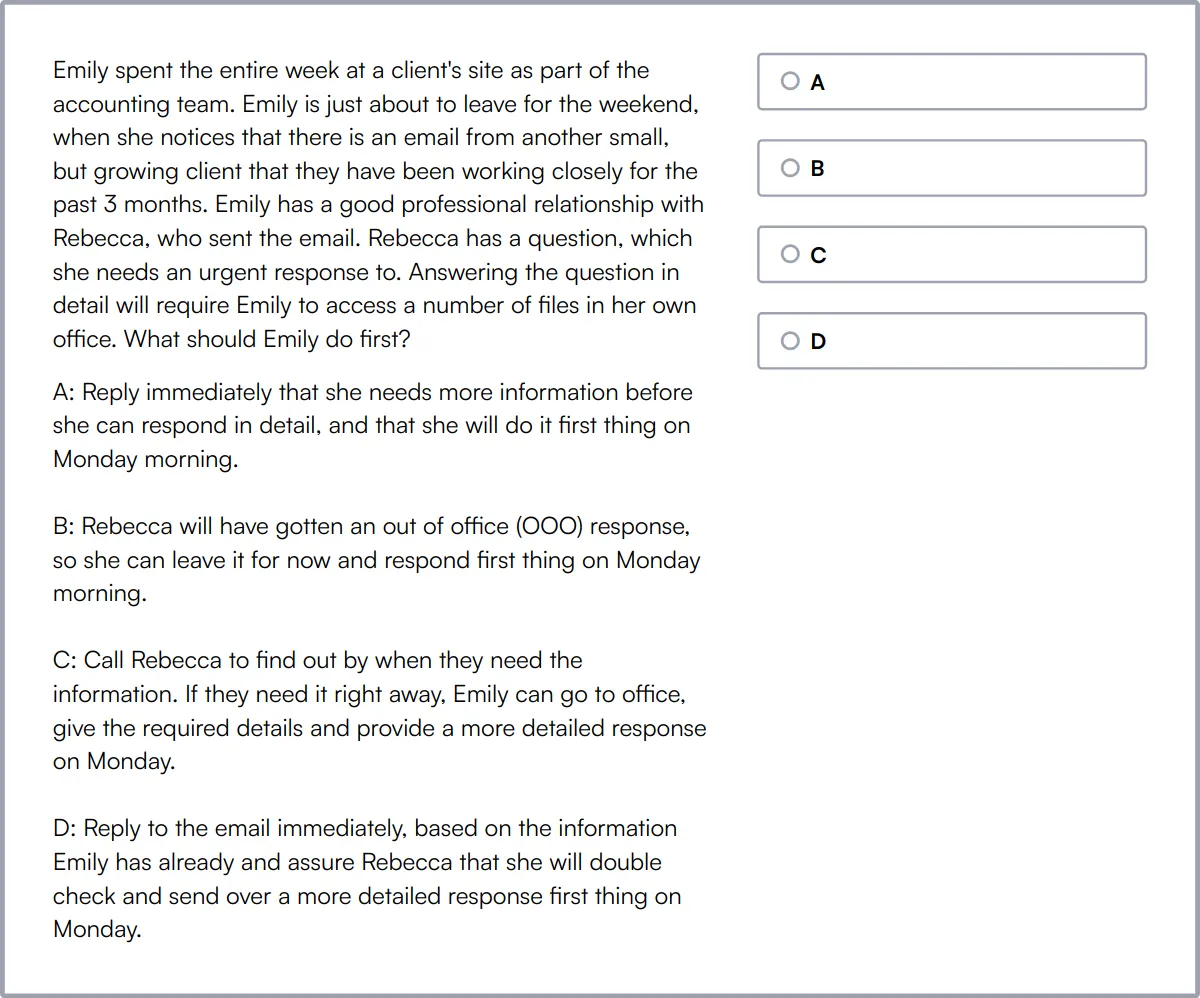
Summary: The 7 key Accounting Intern skills and how to test for them
| Accounting Intern skill | How to assess them |
|---|---|
| 1. Attention to Detail | Review accuracy in financial records and reports. |
| 2. Numerical Proficiency | Evaluate ability to perform accurate calculations. |
| 3. Analytical Thinking | Assess capability to interpret financial data. |
| 4. Time Management | Check how well deadlines are met. |
| 5. Technical Proficiency | Test knowledge of accounting software and tools. |
| 6. Communication Skills | Observe clarity in conveying financial information. |
| 7. Ethical Judgment | Evaluate adherence to ethical standards. |
Accounting Assessment Test
Accounting Intern skills FAQs
What skills should recruiters assess when hiring an accounting intern?
Recruiters should evaluate skills such as attention to detail, numerical proficiency, analytical thinking, and technical proficiency. Additionally, soft skills like communication, ethical judgment, and team collaboration are important.
How can recruiters test numerical proficiency in accounting interns?
Numerical proficiency can be assessed through standardized tests, practical exercises involving financial data, or case studies that require interns to analyze and interpret numerical information.
What are effective methods to evaluate problem-solving skills in accounting interns?
Problem-solving skills can be evaluated by presenting candidates with real-life accounting scenarios that require them to develop and propose viable solutions. Role-playing activities and situational judgment tests are also useful.
Why is ethical judgment important for accounting interns?
Ethical judgment is critical in accounting due to the sensitive nature of financial data. Interns must demonstrate integrity and the ability to adhere to legal and regulatory standards.
How can time management skills be assessed during the recruitment process?
Time management skills can be assessed by observing how candidates handle deadlines in simulation exercises or during internships. Questions about handling multiple projects or tight deadlines during interviews can also provide insights.
What role does technical proficiency play in the success of accounting interns?
Technical proficiency, especially in accounting software and spreadsheet tools, is key for efficiency and accuracy in accounting tasks. Assessing these skills through practical tests or software proficiency exams is advisable.
How important are communication skills for accounting interns, and how can they be assessed?
Communication skills are essential for presenting reports, explaining financial information, and collaborating with teams. These can be assessed through presentations, group discussions, and written assignments during the selection process.
Can adaptability be assessed in an interview for an accounting intern, and if so, how?
Adaptability can be assessed by asking candidates about times they adjusted to significant changes or unexpected challenges. Behavioral interview questions are particularly effective for this.

40 min skill tests.
No trick questions.
Accurate shortlisting.
We make it easy for you to find the best candidates in your pipeline with a 40 min skills test.
Try for freeRelated posts
Free resources



